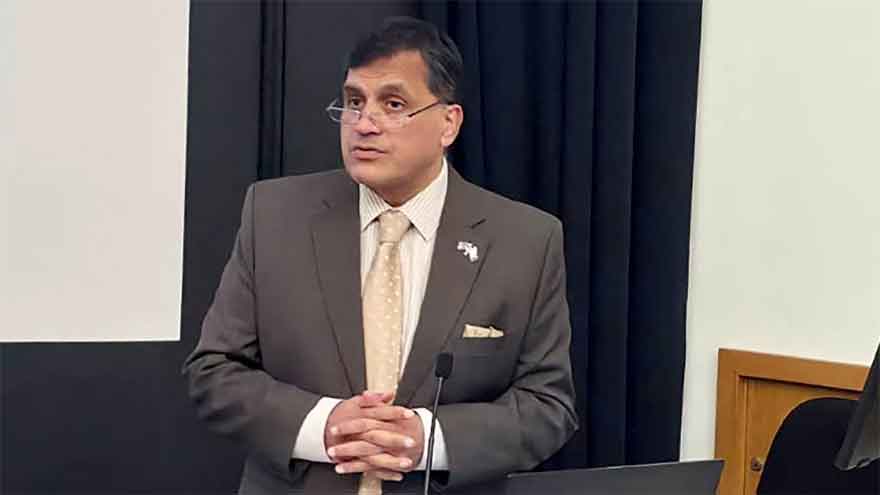BUCKINGHAM (Dunya News) – Pakistan’s High Commissioner to the UK, Dr Mohammad Faisal, has said the Jammu and Kashmir dispute remains the core issue behind the ongoing tensions between Pakistan and India.
Speaking at a forum organised by the Centre for Security and Intelligence Studies (BUCSIS) at the University of Buckingham titled “India-Pakistan Strategic Rivalry: A Regional Security Analysis,” Dr Faisal addressed a diverse audience comprising faculty members, researchers, students, media representatives, and scholars. The event also included a Q&A session.
During his address, Dr Faisal drew attention to the April 22, 2025 Pahalgam incident in Indian Illegally Occupied Jammu and Kashmir (IIOJK), where 26 tourists tragically lost their lives.
He stated that Pakistan had strongly condemned the incident and even offered an independent international investigation, but India instead responded with baseless allegations, unilateral actions such as suspending the Indus Waters Treaty, and unprovoked military aggression.
Dr Faisal stressed that Pakistan exercised its right to self-defense with a proportional response. He warned that the situation could escalate dangerously, with far-reaching consequences for regional and global peace.
The High Commissioner reiterated Pakistan’s principled stance in favor of a peaceful resolution of the Kashmir dispute in accordance with United Nations Security Council resolutions and the aspirations of the Kashmiri people.
He criticised India for trying to weaponise water resources by violating the Indus Waters Treaty, a move that threatens Pakistan’s agriculture-dependent economy and regional stability.
Highlighting Pakistan’s role as a frontline state in the global war on terror, Dr. Faisal referred to the country’s sacrifices and successful counter-terror operations. He also accused India of supporting terrorism and launching disinformation campaigns aimed at maligning Pakistan.
Calling for peaceful cooperation, he reaffirmed Pakistan’s commitment to dialogue and responsible engagement, stressing that South Asia’s security has global implications. He urged the international community to play its part in preventing conflict between two nuclear-armed nations.
Concluding his remarks, Dr. Faisal laid out Pakistan’s vision for a peaceful and prosperous South Asia built on dialogue, connectivity, and regional cooperation. He cited initiatives like the China-Pakistan Economic Corridor (CPEC) and the Kartarpur Corridor as paths to shared peace and development.
He thanked the University of Buckingham and the South and Southeast Asia Security Research Centre (SSEASRC) for facilitating this important discussion on the evolving security landscape in South Asia, particularly the Pakistan-India dynamic.
Vice Chancellor Professor James Tooley noted that tensions between Pakistan and India have global ramifications and called the forum timely and necessary. Professor Julian Richards, Director of BUCSIS, emphasised the need to continue hosting such discussions on vital geopolitical issues.
Related Topics
Subscribe Dunya News on YouTube
‘ ;
r_text[1] = ” ;
r_text[2] = ” ;
r_text[3] = ” ;
r_text[4] = ” ;
r_text[5] = ” ;
r_text[6] = ” ;
var i = Math.floor(r_text.length * Math.random());
document.write(r_text[i]);
